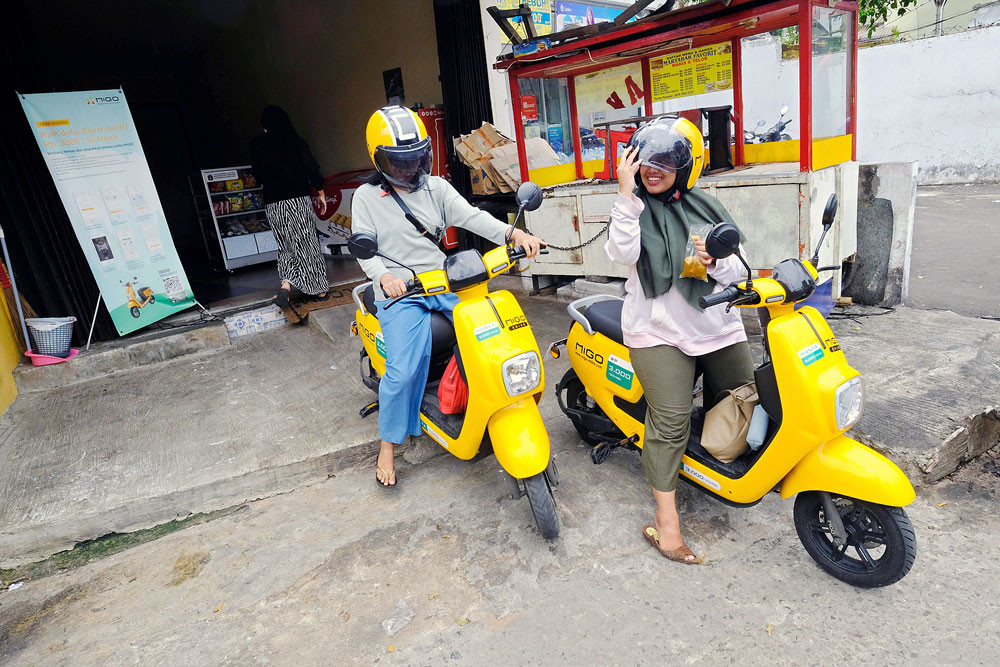Popular Reads
Top Results
Can't find what you're looking for?
View all search resultsPopular Reads
Top Results
Can't find what you're looking for?
View all search resultsWhere to go, Migo?
After two months of operation, the electric bicycle rental app Migo must soon pull its yellow fleet off the roads across Jakarta, to the dismay of hundreds of its customers who had found a new trick to beat the capital city’s unforgiving traffic.
Change text size
Gift Premium Articles
to Anyone
A
fter two months of operation, the electric bicycle rental app Migo must soon pull its yellow fleet off the roads across Jakarta, to the dismay of hundreds of its customers who had found a new trick to beat the capital city’s unforgiving traffic.
Since its arrival in early December, the China-based company has been met with public enthusiasm. Many Jakarta people, ranging from office workers to students, shifted to Migo electric scooters as a mode of transportation, which only cost Rp 3,000 (21 US cents) per half hour — quite a cheap bargain compared with the ubiquitous app-based motorcycle taxis.
The new business model has also profited Migo partners, who allocate space at their houses for stations where customers can park or find the rental scooters.
However, on Wednesday the Jakarta Police threatened to ban the scooters because of violations of the 2009 Traffic Law. The head of the Jakarta Traffic Police’s law enforcement subdirectorate, Comr. Herman Ruswandi, said Migo’s operation was illegal as the scooters have never gone through roadworthiness tests and have neither vehicle registration documents nor license plates.
Herman insisted Migo was operating motorized vehicles, rather than bicycles as claimed. Indeed, by appearance the Migo electric bike resembles a motorcycle. With a maximum velocity of 40 kilometers per hour, one can carry a load of 100 kilograms and cover a distance of 40 to 60 km if running on a fully charged battery.
The controversy surrounding Migo is simply a consequence of a disruption of the way businesses work. It’s safe to say that Migo is disrupting a business model that only a few years ago disrupted older established players. Ride-hailing apps Go-Jek, Grab and Uber, the last of which has been acquired by Grab, faced the same hurdles now standing in Migo’s way.
Go-Jek and Grab had to confront regulatory constraints because the government was barely prepared for the digital economy. After a tug-of-war, not to mention differences within the government, the two digital industry giants have now seen their markets thrive. Go-Jek, one of a few Indonesian unicorns, has expanded its business overseas.
Now the story repeats itself in the case of Migo. It has created a niche market that is sadly unregulated. That the police took such tough measures against Migo only two months after it started business here once again shows the government’s stuttering response to the fast development of digital industries.
For its part the government has to speak in unison when disruptions occur, which therefore requires clear regulations as a guideline. In the case of Migo, it has to identify the vehicle as a motorcycle, not a bicycle, if there is any doubt. Furthermore, clear regulations would prevent the government from discouraging innovation that plays a far more crucial role in industry today than in the past.
Nevertheless, Migo, like Go-Jek and Grab, teaches a lesson that the government still has to go the extra mile to provide the type of reliable and better public transportation that characterizes a civilized society.










